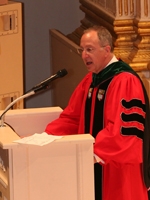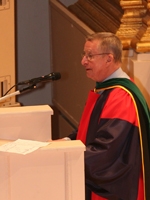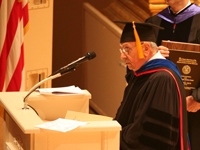Click here for a slideshow of Commencement 2008.

The Class of 2008 take the Hippocratic oath at commencement, May 29.
A four-year journey reached its conclusion Thursday, May 29, as Weill Cornell Medical College and Weill Cornell Graduate School of Medical Sciences held commencement exercises at Manhattan's famed Carnegie Hall. The graduating class of 2008 included 13 M.S. degrees, 39 Ph.D. degrees and 96 M.D. degrees. The ceremonies were presided over by Dr. Charles Walcott, dean of the Cornell University Faculty; Dr. Antonio M. Gotto Jr., dean of Weill Cornell Medical College; and Dr. David P. Hajjar, dean of Weill Cornell Graduate School of Medical Sciences. The ceremony waspreceded by an invocation by the Rev. Carlos B. Quijano, O.P.
Dr. Daniel R. Alonso, dean of Weill Cornell Medical College in Qatar, introduced the medical school's inaugural graduating class. Cornell University is the first American institution to offer a M.D. degree abroad.
In his remarks — which began with a moment of silence for Stephen H. Weiss, the first chairman of the Weill Cornell Medical College Board of Overseers, who passed away in April — Dr. David J. Skorton, president of Cornell University, lauded the remarkable achievements of the graduating class. They published papers, engaged in critical research, excelled at clinical care and, perhaps most importantly, embraced their responsibility to the global medical community by assisting local physicians in treating underserved populations in Haiti, Tanzania and other nations.

Dr. David J. Skorton
Many of the graduates of the Weill Cornell Graduate School of Medical Sciences mentored students in New York City public schools, and the pioneering class from Doha pursued anti-smoking campaigns and vaccination drives in their local communities in Qatar.
As graduates of one of the world's most prestigious medical schools and ready to embark on their residencies, Dr. Skorton reminded the young doctors that the responsibility and good works expected of them will only continue to increase.
"The intentions and actions of the physician and the scientist must be motivated only by their aspiration to enhance the general welfare," Dr. Skorton said. "For this reason, in addition to developing your skills as clinicians and biomedical researchers, your teachers have worked hard to impart to you a sense of the ethics that underlie medicine and biomedical research."
As a practicing cardiologist, Dr. Skorton impressed upon the graduates the ethical issues that have surfaced in his own career, such as treating patients whose cardiac conditions could possibly have consequences for others. The graduates are entering a new world of medicine, where screening and genetic testing could reveal not only disease, but the possibility of future illness. These new technologies not only bear the hope of future cures but also risk of great ethical dilemmas.
"Your years at this medical school have provided you with the finest scientific and clinical training available," Dr. Skorton said. "I hope they have also given you a strong ethical and moral framework that will continue to provide context and meaning to what you do — long after some of the specific techniques you learned seem quaint and obsolete."

Dr. Antonio M. Gotto Jr.
Omar Vandal, the Weill Cornell Graduate School of Medical Sciences student speaker, echoed Dr. Skorton's remarks, painting science not only as a conduit to bettering the lives of others, but also as a common thread that connects us all.
"Science is not only a pursuit that strives to remove boundaries, but one that can also bridge the chasms around us," Vandal said.
Before Dean Gotto and Dean Alonso administered the Hippocratic oath and presented the candidates for the degree of doctor of medicine, Medical College student speaker Scott Kaplan injected a healthy dose of humor into the formal proceedings.
With an easel and a large pad of newsprint serving as visual accompaniment to his speech, Kaplan — via a pie chart — instructed the audience on how he prepared to address his classmates. And while most of his preparation consisted of figuring out just exactly who voted for him as speaker, and watching the first two seasons of HBO's "The Wire," Kaplan assured the audience that at least a fraction of his time was spent actually writing a speech that urged his classmates to keep a sense of perspective regarding their new professions.
"In the future take care and take time to take it easy," Mr. Kaplan said. "We can work hard and still find some time for ourselves."
The commencement exercise also honored two distinguished members of the Medical College and Graduate School alumni. Amir Askari, Ph.D., class of 1960, received the Graduate School's alumni award of distinction, and Elizabeth G. Nabel, M.D., class of 1981, was so honored by the Medical College Alumni Association.

Dr. Elizabeth G. Nabel, recipient of the Medical College Alumni Award of Distinction.

Dr. Amir Askari, recipient of the Medical College Alumni Award of Distinction.
Photography by Richard Lobell.

